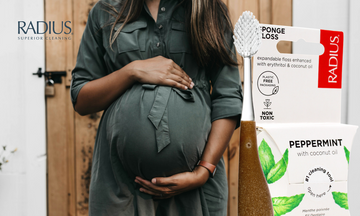Pregnancy brings about many changes in a woman's body, including hormonal fluctuations that can impact oral health. In this blog, we'll discuss common concerns related to oral health during pregnancy and provide best practices to help expectant mothers maintain a healthy smile for themselves and their babies.
Common Concerns During Pregnancy
-
Gingivitis: Hormonal changes during pregnancy can increase the risk of gingivitis, a mild form of gum disease characterized by red, swollen, and tender gums. Without proper care, gingivitis can progress to more severe gum disease.
-
Pregnancy Tumors: Some pregnant women may develop pregnancy tumors, which are non-cancerous growths that appear on the gums. While these tumors are usually harmless and resolve after childbirth, they can cause discomfort and bleeding.
-
Tooth Decay: Changes in diet and oral hygiene habits during pregnancy, coupled with increased acidity in the mouth, can contribute to tooth decay and cavities.
-
Morning Sickness: Morning sickness, a common symptom of early pregnancy, can lead to increased acidity in the mouth due to vomiting. This acidity can weaken tooth enamel and increase the risk of erosion and cavities.
Best Practices for Maintaining Oral Health during Pregnancy
-
Brush and Floss Regularly: Good oral hygiene is essential for preventing gum disease and tooth decay. Brush your teeth at least twice a day with a fluoride toothpaste like the USDA Organic Mint Aloe Neem toothpaste from RADIUS and floss daily to remove plaque and food particles from between the teeth and along the gumline.
-
Attend Regular Dental Check-ups: Schedule a dental check-up and cleaning before or early in your pregnancy to address any existing oral health issues and receive personalized recommendations for maintaining oral health throughout your pregnancy.
-
Manage Morning Sickness: If you experience morning sickness, rinse your mouth with water or a fluoride mouthwash after vomiting to help neutralize acidity and protect tooth enamel. Avoid brushing your teeth immediately after vomiting, as the abrasive action of toothbrush bristles can further damage weakened enamel.
-
Eat a Balanced Diet: A diet rich in fruits, vegetables, whole grains, and lean proteins provides essential nutrients for both you and your baby's health. Limit sugary snacks and beverages, which can contribute to tooth decay, and opt for nutritious alternatives.
-
Stay Hydrated: Drink plenty of water throughout the day to stay hydrated and help maintain saliva production. Saliva helps wash away food particles and neutralize acids in the mouth, protecting against tooth decay and gum disease.
-
Use Pregnancy-Safe Products: Choose oral care products that are safe for use during pregnancy, such as the Natural Silk Floss from RADIUS, which is gentle on sensitive gums and free of harsh chemicals.
Conclusion
Pregnancy is an exciting time, but it's essential to prioritize your oral health to ensure the well-being of both you and your baby. By following these best practices and incorporating pregnancy-safe oral care products into your routine, you can maintain a healthy smile throughout your pregnancy and beyond. At RADIUS, we're committed to providing high-quality oral care products to support you on your journey to motherhood.

